President Stig Enemark attends the 5th World Urban Forum in
Rio, and meeting of the GLTN International Advisory Board
Rio de Janeiro, Brazil, 22-26 March 2010
|

The famous Copacabana beach with the Sugar Loaf
cliff in the background. |
The Fifth World Urban Forum
(WUF5) organised by UN-HABITAT took place in Rio de Janeiro, Brazil, 22-26
March 2010. The theme of this WUF5 was “The Right to the City - Bridging
the Urban Divide”.
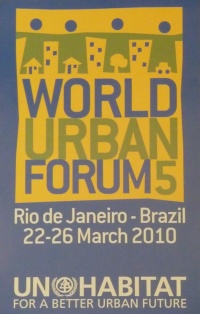 |
The main topics of WUF5 included how to tackle rapid urbanisation
and its impact on the poor. More than 20,000 participants from
non-governmental organisations, community-based groups, urban
professionals, academics, government, local authorities, and
national and international associations attended at the forum.
Through a series of round-table discussions, dialogues, and
networking events participants discussed formal and informal ways of
action-oriented proposals on how to bridge the urban divide. “Today´s
urban divide is largely an outcome of the biases and inadequacies of
the three main tiers of government – central local and municipal”
said Dr. Anna Tibaijuka, Executive Director of UN-HABITAT in
her opening speech.
WUF is a biennial gathering established by the
United Nations in 2002 to address the issue of rapid urbanization
and its impact on communities, cities, economies, and policies. Its
previous four sessions were held in Nairobi, Barcelona, Vancouver,
and Nanjing. The next forum is likely to be held in Brunei in 2012.
|
|
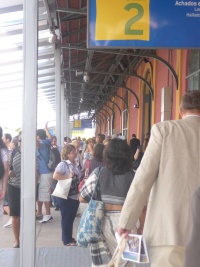
The Forum was hosted in newly city
renovated harbour warehouses. |

The beautiful Rio environment
|
FIG was represented at the
Forum by President
Stig Enemark who attended and gave presentations in a number of
sessions out of the overwhelming program:
-
The World Urban Campaign:
“the 100 Cities Initiative – towards bridging the urban divide”.
The campaign is designed as an experimental phase lasting 12 to 18
months to test how best to appeal to and mobilize people, communities,
municipal officials, service providers, and the political leadership of
any city. It does so by encouraging these actors to tell their story on
how they are contributing to a better and more sustainable city. After
this initial test phase to culminate in a 100 Cities Summit, the
initiative would be opened to broader participation by all cities
committed to open learning and sharing.
-
Habitats Professionals
Roundtable: “What Role for the Urban Professionals in the World Urban
Campaign”. The objective was to discuss what professionals can do to
help UN-HABITAT in its sustainable urbanization mission. The more
specific mission was to present the HPF´s Charter and to discuss how
this can be effectively applied in practice.
-
GLTN Roundtable: “Piloting
of a GLTN Land Tool: A Practical Way to Ensure Gender Equity”. The
objective was to share experiences, challenges, and lessons learnt in
the piloting of the Gender Evaluation Criteria tool; and to discuss
further opportunities and the next steps and ways forwards. After the
presentation of the pilot experiences from Brazil, Ghana, and Nepal, a
panel of experts and practitioners from academia, professionals, civil
society, grassroots, government sector and development partners provided
their views and comments which contribute to the critical next steps and
way forward. FIG, by Dr. Diane Dumashie, Chair of FIG Com. 8 has
played a key role in developing and assessing the evaluation criteria
and the pilot processes.
-
Networking Event: “Count
me in, for planning my city”. The event provided a networking
opportunity for professionals from academia, government, community-based
organizations, civil society and private sector, for sharing experiences
about participatory enumeration, a community-led surveying technique.
The event provided a networking opportunity for professionals from
academia, government, community-based organizations, civil society and
private sector, for sharing experiences about participatory enumeration,
a community-led surveying technique. The participants were given two
sheets of policy brief and a CD with the new book published by
UN-Habitat: ‘Count me in: Surveying for Tenure Security and Urban
Land Management’
-
Networking event: “Access
to Security of tenure and Housing Finance”. Focus was on discussing
the impact of a well functioning market for housing finance in
developing countries; and to highlight that proper land governance is a
prerequisite for sustainable land use, social stability, and inclusive
land markets. The event was organized by Sweden, the Ministry of
Finance, The Swedish Housing and Credit Guarantee Board, and
Lantmäteriet, the Swedish Mapping, Cadastral, and Land Registration
Authority.
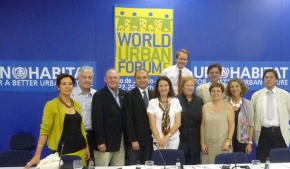
Representatives of the UN-Habitat Professional Forum. |
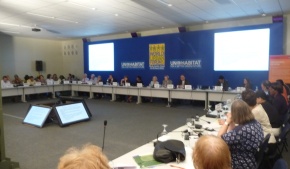
Round Table meeting on Gender Equity. |
Following the WUF5 President
Enemark also attended the meeting of the GLTN International Advisory Board
(IAB). The GLTN profile including the objectives and themes is available at
http://www.gltn.net. The IAB is established to provide objective advice
on issues related to the GLTN policies, operational strategies and projects.
The full advisory board is available at:
www.gltn.net/index.php?option=com_content&task=view&id=18&Itemid=63
The key issues of the IAB
meeting included a comprehensive review of the GLTN 2009 Annual Progress and
Financial report. The overall assessment reveals that GLTN has been very
successful in achieving their goals and the GLTN partners are very committed
in their support. Next IAB meeting is likely to be held in conjunction with
the FIG presidential handover meeting in Copenhagen by the end of November
2010.
Finally, President Enemark
also visited the Brazilian Society of Cartography, Geodesy, Photogrammetry
and Remote Sensing (SBC) to discuss with the Council and President Paulo
Cesar Trino, about the future involvement of SBC in FIG and the
possibility of hosting a future FIG event and thereby strengthening the
surveying profession in the Latin American region. A following lunch meeting
further confirmed the good relations between SBC and FIG.
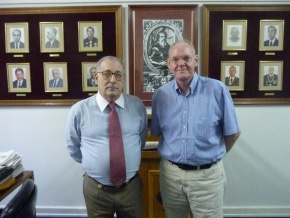
Paulo Cesar Trino, SBC President and Stig Enemark,
FIG President. |
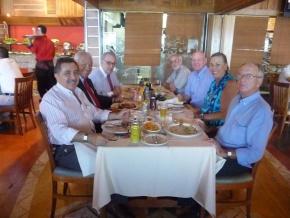
Lunch meeting with members of SBC
|
Read more:
|
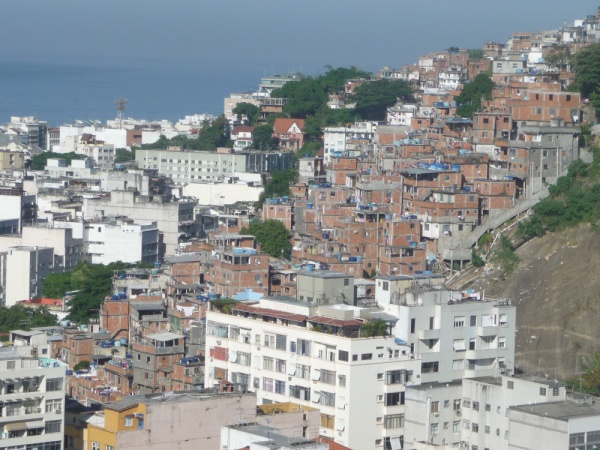
Example of the “Favelas” (slum settlements) in Rio. About 20 per
cent of Brazil´s population live in poor urban human settlements.
Government is working closely with UN-HABITAT to improve this
situation.
|
|































